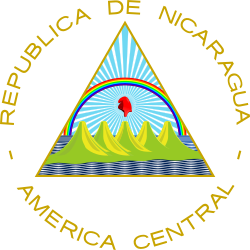International relations with intergovernmental organizations and countries
Nicaragua signed a 3-year Poverty Reduction and Growth Facility (PRGF) with the International Monetary Fund (IMF) in October 2007. As part of the IMF program, the Government of Nicaragua agreed to implement free market policies linked to targets on fiscal discipline, poverty spending, and energy regulation. The lack of transparency surrounding Venezuelan bilateral assistance, channeled through state-run enterprises rather than the official budget, has become a serious issue for the IMF and international donors. On September 10, 2008, with misgivings about fiscal transparency, the IMF released an additional $30 million to Nicaragua, the second tranche of its $110 million PRGF. [1]
The flawed municipal elections of November 2008 prompted a number of European donors to suspend direct budget support to Nicaragua, a move that created a severe budget shortfall for the government. This shortfall, in turn, caused the Government of Nicaragua to fall out of compliance with its PRGF obligations and led to a suspension of PRGF disbursements. The IMF is currently in negotiations with the Government of Nicaragua to reinstate disbursements. [1]
Under current president Daniel Ortega, Nicaragua has stayed current with the Central American-Dominican Republic Free Trade Agreement, which entered into force for Nicaragua on April 1, 2006. Nicaragua exports to the United States, which account for 59% of Nicaragua's total exports, were $1.7 billion in 2008, up 45% from 2005. Textiles and apparel account for 55% of exports to the United States, while automobile wiring harnesses add another 11%. [1]
Other leading export products are coffee, meat, cigars, sugar, ethanol, and fresh fruit and vegetables, all of which have seen remarkable growth since CAFTA-DR went into effect. Leading Nicaraguan exports also demonstrated increased diversity, with 274 new products shipped to the United States in the first year. U.S. exports to Nicaragua, meanwhile, were $1.1 billion in 2008, up 23% from 2005. Other important trading partners for Nicaragua are its Central American neighbors, Mexico, and the European Union. Nicaragua is negotiating a trade agreement with the European Union as part of a Central American bloc. [1]
Despite important protections for investment included in CAFTA-DR, the investment climate has become relatively insecure since Ortega took office. According to the United States State Department, President Ortega's decision to support "radical regimes" such as Iran and Cuba, his harsh rhetoric against the United States and capitalism, and his use of government institutions to persecute political enemies and their businesses, has had a negative effect on perceptions of country risk, which by some accounts has quadrupled since he assumed office. The government reports foreign investment inflows totaled $506 million in 2008, including $123 million in telecommunications infrastructure and $120 million in energy generation. [1]
There are over 100 companies operating in Nicaragua with some relation to a U.S. company, either as wholly or partly owned subsidiaries, franchisees, or exclusive distributors of U.S. products. The largest are in energy, financial services, textiles/apparel, manufacturing, and fisheries. However, many companies in the textile/apparel sector, including a $100 million U.S.-owned denim mill, had shuttered by 2017. [1]
Poor enforcement of property rights deters both foreign and domestic investment, especially in real estate development and tourism. Conflicting claims and weak enforcement of property rights has invited property disputes and litigation. Establishing verifiable title history is often entangled in legalities relating to the expropriation of 28,000 properties by the revolutionary government that Ortega led in the 1980s. The situation is not helped by a court system that is widely believed to be corrupt and subject to political influence. [1]
Illegal property seizures by private parties, occasionally in collaboration with corrupt municipal officials, often go unchallenged by the authorities, especially in the Atlantic regions and interior regions of the north, where property rights are poorly defined and rule of law is weak. Foreign investor interest along the Pacific Coast has motivated some unscrupulous people to challenge ownership rights in the Departments of Rivas and Chinandega, with the hope of achieving some sort of cash settlement. [1]
In October 2022, the European Union declared the Nicaraguan representative Zoila Müller non grata. [2]




